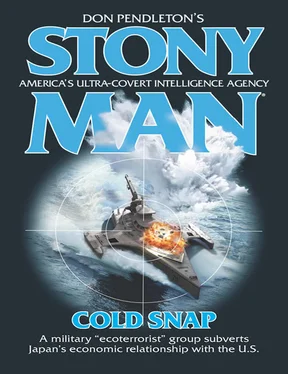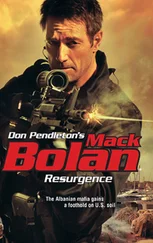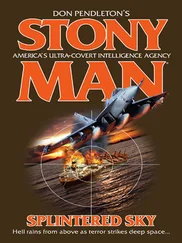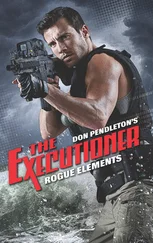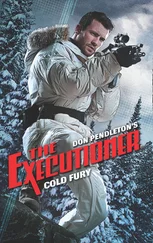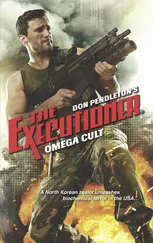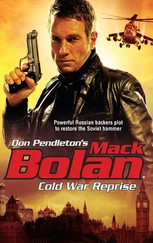“Makes you wonder if fifty to a hundred years from now, some hush-hush group disguises their disposal of witnesses as the work of a fiend with a machete and a hockey mask,” Manning mused.
Moone, her mousy-brown hair cut short, but not boyishly so, might have been more attractive if all the blood had not drained from the right side of her face, leaving it gaunt, and settled into the left side, rendering it bloated and discolored. Her hazel eyes glinted in the shielded light, her having died with them open.
“Not a real Thuggee. They always close the eyes of their victims,” Hawkins noted.
“Obfuscation, obfuscation,” Manning repeated grimly. He turned away from the scene and moved toward the back of the house. The front door was locked, and there might have been another exit.
Hawkins knew that the death she suffered would not have been easy or gentle. The coin in the center of the garrote would have crushed her windpipe, so even if the pressure had been released, she would have had no chance of getting another breath. The strangling cord had been pulled tight, but there were no signs of fists balled up against the underside of her mandibles, meaning that while she’d suffocated, her brain had received blood. Moone wouldn’t have passed out.
A crust of dried tears pooled at the corners of her eyelids. Her end had been slow. Cruel. Meticulous.
All to cover up a conspiracy. This woman, who genuinely had taught people a language they’d wanted to learn, had been murdered. She’d gained information about what might have been a clue as to why shiploads of Japanese whalers died in a salvo of ship-busting missiles. Hawkins normally had a low opinion of those who engaged in wanton murder, but so far the logic of these brutal deaths escaped him.
Certainly, Hawkins had more than a little passing concern for the smart, almost relatable giant mammals of the ocean. Even as a good-ol’-boy hunter, he believed in conservation, not sloblike slaughter. He couldn’t fathom the slaughter of an endangered animal just to make a rug or to simply get a piece of rhinoceros horn to enhance the strength of their own horn. Be that as it may, the Japanese sailors killed on the factory ships were not killers. They’d simply been working jobs to feed their families.
However, many in the world saw the deaths of “evil Japanese hunters” as a cause to rejoice. Those who simply wanted to protect an endangered species, and the lawmen who sought to protect their freedom of speech, had also been slaughtered.
Dead was dead, so it shouldn’t matter, but Hawkins was offended. He was raised with strong values of what was right and what was wrong. Being murdered for doing your job was in the wrong column, so he sympathized with the Japanese sailors, and even more for the widows, orphans, surviving siblings and parents of those who’d died at sea.
Moone was a covert operative; she’d known that any one of her investigations could have brought her to a violent death. But seeing her lying there, murdered in this manner, Hawkins felt a pang of guilt for her. She looked innocent. She’d tried to do right by her country. She was a sister in arms. A face to which he could attach the statistics of those murdered.
Movement out in front of the house brought Hawkins’s attention back to the present and he rose from beside the dead girl. The light had instantly been smothered by his hand and he made certain the toggle switch was turned off. “Gary?”
“I’m out in the alley,” Manning answered over his hands-free com.
Hawkins padded in the direction his friend had gone. “Movement through the front door.”
“I’ll circle around,” the Canadian returned. “Stay put unless it’s a badge.”
“Yes, sir,” the Texan replied. He perched in the shadows by the back door, making certain that his presence was unseen in the frame of the partially open entrance.
Tense, he waited to see who would show up on the doorstep of a murdered girl. And just in case, he had both knives out and ready, hoping to greet the assassin.
CHAPTER FIVE
The door swung clumsily on its hinges, the shattered lock giving no resistance as it was pushed open and reached the apex of its usual swing with a slam. No flashlights sprayed their glare, no echo beyond the entrance to Moone’s kitchenette. T. J. Hawkins was familiar enough with police procedure to know that cops would not enter a darkened house without lights. Sure, the glare would make them an obvious focus, but in dim conditions as in Moone’s almost empty home, the blaze of LED bulbs would actually do more to blind an ambusher than anything else.
As well, police officers would also call out to inquire if anyone was in trouble within.
The bastard or bastards at the door were most likely not cops.
That meant that he and Manning had made contact with an enemy. Hawkins subvocalized confirmation to his partner. “Close them off.”
“On it,” Manning returned.
Two syllables and Hawkins knew there was nothing that would stop the big Canadian from coming to his aid short of a wall of blazing death. And even then, Manning’s combination of genius and brawn would likely find a way to punch through that barrier, as Hawkins had come to know the Phoenix Force veteran.
Even as Hawkins thought of the difference between how police and criminals would enter a house with a broken door, he replaced the small Karambit in its sheath, drawing the pocket flashlight, thumb over the cap switch. The tiny light would prove useful, not only in the prevention of mistaking Moone’s CIA contact with a murderer, but also blinding them in the darkness if they truly were here with murderous intent.
The first figure lurched into view and Hawkins hit the switch, blasting him in the face with 320 lumens of brilliance. The painful blue blaze made Hawkins’s target throw his hands up to shield his eyes and, in a moment, Hawkins could discern the brief flash of Korean features as the man backpedaled. Hawkins could also make out the gleaming silver finish of a Desert Eagle in the intruder’s hand. Normally this would have been all the justification any member of Phoenix Force would need to use their weapon to kill the armed opponent, except for two things.
T. J. Hawkins was a member of Phoenix Force, and had been chosen not just for his willingness and ability to kick ass, but also his quick wits and swift decision-making. While Hawkins had allies who regularly used the Desert Eagle magnum autoloader—Mack Bolan and Gary Manning chief among them—he had yet to see a five-foot-one Korean woman pick such a large and unwieldy weapon as her primary weapon. Hawkins held off on utilizing the Ranger knife, instead using the flat of the blade as leverage to hook the woman’s gun wrist and tug powerfully.
Her grip on the pistol broke, and instead of the clunk of heavy, high-quality steel impacting the wood flooring, it was something lighter. Hawkins also realized that the gun in the woman’s hand was not cocked. The Desert Eagle was a single-action design, with a slide-mounted safety. Carrying the gun with the hammer down was no way to use it, not without clumsily thumbing back the hammer to make it fire.
The woman had been given an air-soft replica of the pistol, likely in an effort to get her shot to death. Hawkins killed the flashlight, then swept the girl behind him. The last thing Hawkins wanted to do was to bring harm to an innocent bystander. Even as the woman dropped to the floor, the Texan was aware that she’d discovered the dead body.
“Veronica!”
The figure behind her was five-foot-six, judging by the size of his shadow, and there were yet two more in the group, both about the same height as the man in the lead. Hawkins had about five inches on all of them, and from the looming shadow behind them, Manning was about to be on hand immediately.
Читать дальше
